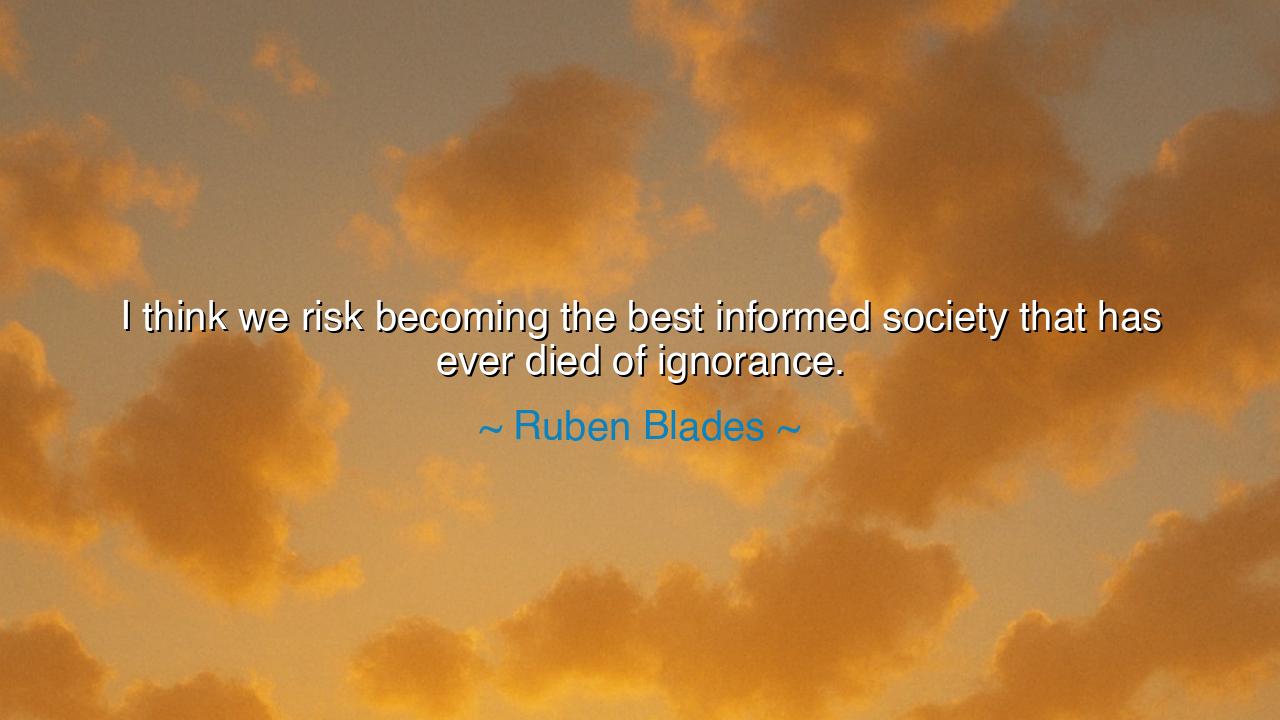
I think we risk becoming the best informed society that has ever






Hear the warning of Ruben Blades, the poet, the singer, the truth-teller of nations: “I think we risk becoming the best informed society that has ever died of ignorance.” These words strike like a bell in a silent hall, calling us to awaken from our slumber. For what is the use of information without wisdom? What is the use of endless knowledge if the heart and spirit remain blind? A society drowning in facts but starving for understanding is like a man who owns a library but never reads—rich in appearance, yet impoverished in truth.
The ancients spoke often of this danger. They feared not only the barbarian at the gates but the rot within their own walls. To be informed is not the same as to be wise. A nation may hold archives filled with data, schools bursting with learning, voices shouting opinions across every street—and yet, if it cannot discern justice from injustice, compassion from cruelty, truth from falsehood, it walks swiftly toward its own demise. Ignorance is not merely the absence of information; it is the refusal to use information rightly.
Consider the fall of Athens after the glory of its golden age. The people were surrounded by philosophers, poets, orators, and historians. Their city was alive with words, debates, and records—yet in their pride, they ignored the wisdom that could have saved them. They rushed headlong into wars of ambition, trusting rhetoric more than reason. In time, their libraries still stood, their scrolls still existed, but their empire was dust. They were, in truth, a society well informed, yet undone by their own ignorance of humility and restraint.
The modern world mirrors this peril. Never before have human beings had such rivers of data flowing before them—screens glowing with endless words, voices, and images. We can know the weather on the other side of the earth, the name of a star a million miles away, the gossip of strangers across oceans. Yet do we know how to listen to our neighbors? Do we know how to live in harmony with the earth that sustains us? Do we know how to see truth beneath the fog of lies? This is the ignorance that Blades warns of: not the lack of access to knowledge, but the lack of courage to live by the truths that matter.
True wisdom is not in the abundance of facts, but in the rightness of action. A society may know the chemical formula for water, yet still poison its rivers. It may know the laws of medicine, yet deny healing to the poor. It may know the history of tyranny, yet still repeat it with blind devotion. Such a society is indeed “the best informed” while it dies of its own ignorance. To escape this fate, knowledge must be married to conscience, learning must be bound to love, and information must serve justice.
The lesson is plain: do not confuse knowing with understanding, nor learning with living. Let every fact you gather become a tool of compassion. Let every truth you discover become a shield against deception. Test what you hear, weigh it in the scales of morality, and then act. Do not allow your mind to be a warehouse of unused truths. Make it instead a forge where raw information is turned into the bright weapons of wisdom.
Therefore, in your daily life, practice these things: when you learn, ask yourself, “How shall I live differently because I know this?” When you read the news, do not merely store it—act upon it with kindness, with justice, with courage. Seek not to be the one who knows the most, but the one who lives the truest. In this way, you will not be counted among those who perish of ignorance, but among those who shine as living torches, carrying wisdom into the dark.






AAdministratorAdministrator
Welcome, honored guests. Please leave a comment, we will respond soon